COLD STERILIZATION WITH ACCELERATED ELECTRONS KILLS PATHOGENS AND INCREASES THE SHELF LIFE OF THE PRODUCTS TO BE PROCESSED!
Approved by FDA & USDA

The U.S. FDA officially permits the use of ionizing radiation for meat and poultry, fresh or frozen. For poultry, FDA regulations authorize doses up to:
– 4.5 kGy for fresh poultry
– 7.0 kGy for frozen poultry
According to the FDA, irradiation:
– reduces pathogens such as Salmonella and E. coli
– prevents spoilage
– extends shelf life
– does not make food radioactive
– does not significantly affect nutritional quality, taste, texture, or appearance
U.S. Code of Federal Regulations 21 CFR Part 179 (Dec. 1, 2005)
Backed by IAEA, FAO and WHO
“Organoleptic tests… showed no significant differences between irradiated and non-irradiated poultry meat.” — IAEA, 1993
“Poultry meat irradiation at approved doses effectively reduces pathogenic microorganisms.” — IAEA, 1993
“Food irradiated up to an overall average dose of 10 kGy presents no toxicological hazard; nutritional and microbiological adequacy are maintained.” — WHO, 1994
“Irradiation can reduce the risk of food poisoning, control food spoilage and extend the shelf-life of foods without detriment to health… This view has been endorsed by… WHO, FAO and Codex Alimentarius.” — IAEA/FAO, 2016
Validated by Recent Studies
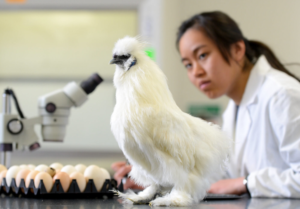
Backed by 30+ years of research, food irradiation is recognized as safe and effective by leading global authorities, including WHO, IAEA, FAO, FDA, and USDA, as well as by the international scientific community.
Scientific evidence shows (2023-2025):
• 2 kGy significantly reduces Salmonella and Campylobacter in poultry.
• 3 kGy lowers total aerobic microflora to undetectable levels.
• 3–4 kGy effectively reduces pathogens without affecting taste, texture or nutritional quality.
• Safe and proven to extend shelf life.
The science is clear — and the latest studies confirm it: irradiation works, safely and effectively.
Antibiotic Reduction in Chicken Meat
“Veterinary antibiotics, such as Amoxicillin, Doxycycline, and Ciprofloxacin, are widely used to treat and prevent diseases and are also incorporated into animal feed to improve growth rate and production efficiency. Well-established ionizing radiation technologies, such as high-energy electron beam, can be applied to remove antibiotic residues from bulk food products.”
“Irradiation treatment (at 3.5 — 7 kGy) of broiler chickens significantly reduces the antibiotic residues; The highest reduction of antibiotic residue was obtained at 7 kGy radiation dose which was assigned to enrofloxacin (86.1%) followed by oxytetracycline (85%) and sulfadiazine (70.3%).”
Cooperation Options
Beamcomplex offers three cooperation options:
1) Turnkey E-Beambox Installation by Beamcomplex
Beamcomplex independently provides the installation of the box with an electron accelerator and assigns its own specialists to perform all commissioning and start-up works.
2) Contract irradiation services
Provision of ionizing radiation treatment services for food products at the multifunctional Radiation Processing Center using the box.
3) Supply and on-site installation of E-Beambox at the partner’s facility
Sale, installation, and commissioning of E-Beambox directly at poultry processing plants, and other industrial facilities.

QUICK INSTALLATION AND QUICK START-UP ON CUSTOMER’S SITE!
Advantages of E-Beambox:
| Operation of the box requires only a site and access to a power supply; no facility remodeling is required. |
| The box’s conveyor system can be integrated into an existing production line for convenient operation |
| E-Beambox is a prefabricated container-type system, ready for quick installation and commissioning. |
| Installation and commissioning of the box eliminates interruptions and delays in the production process |
Technical Characteristics of the E-BeamBox
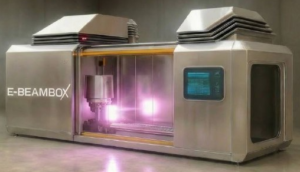
E-BEAMBOX includes:
• Electron accelerator (of various power/energy)
• Special equipment (conveyor systems, radiation monitoring systems, etc.)
• Radiation shield (filled with concrete on-site)
Minimum installation area — 12 x 2.5 m
Models C5.100EXRK12 / C5.50EXRK12
• Designed for processing products in bulk, bags, boxes or on pallets.
• Equipped with two conveyor lines: for boxes/bags and for palletized loads.
E-Beambox Placement Options
In the finished goods workshop – to process packaged products before shipment – a fully integrated system without changing the production cycle.
Technical Parameters
- Dose: 3 kGy
- Power: 100 kW
- Throughput: up to 6 t/h (X-Ray, product > 50 mm)
Main advantage of E-Beambox: may be installed in existing facilities with limited space.

In the production workshop, after packaging, with direct connection to the existing conveyor line – a fully integrated system without changing the production cycle.
Technical Parameters
- Dose: 3 kGy
- Power: 100 kW
- Throughput: up to 120 t/h (E-beam/X-Ray, product < 50 mm)
Main advantage of E-Beambox: may be installed in existing facilities with limited space.

IONIZING RADIATION TREATMENT TECHNOLOGY
E-BEAMBOX generates E-beam and X-Ray that penetrate various substances, materials and products. The electron beam technology is used for sterilization purposes of food products.
 E-beam (Electron Beam) — High-speed electrons → Precise, powerful processing
E-beam (Electron Beam) — High-speed electrons → Precise, powerful processing
• An E-beam is a stream of fast-moving electrons.
• Electrons are very light and charged, so they can be accelerated easily.
• When accelerated, they form a high-energy beam that can treat and modify materials.
X-Ray — High-energy photons → Deep penetration through materials
• X-rays are high-energy electromagnetic waves.
• Their photons have enough energy to ionize atoms and break molecular bonds.
• This makes X-rays an effective form of ionizing radiation for product treatment.
Examples of Treated Products
ANTIBACTERIAL TREATMENT OF SEAFOOD WITH E-BEAM AND X-RAY RADIATION TO DESTROY PATHOGENIC MICROORGANISMS (SALMONELLA, HELMINTHS, ETC.)
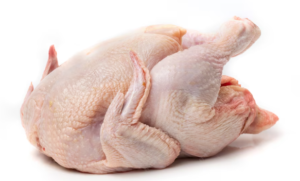

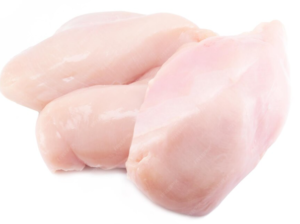
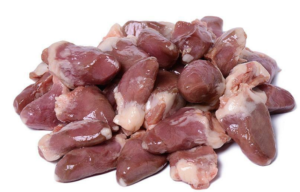
Advantages of Installing E-Beambox Directly On Site
Stronger brand trust – advanced on-site technology clearly demonstrates a high level of safety and reliability to consumers
Faster time-to-market – eliminating external logistics significantly speeds up product release
Full quality control – all processing is performed under your own supervision, with no reliance on external service providers
Maximum flexibility – treatment of any product format: individual packs, boxes, or full pallets
Advantages of Receiving Processing Services at the Center
Logistics convenience – the center may be located near major seafood producers, logistics centers, sea and river ports, and other key facilities
100% safety guarantee – processing using electron accelerators with the energy of up to 10 MeV is a completely safe process that leaves no residual radiation in products
Quality guarantee according to international standards – each batch of processed products receives a certificate that meets international standards
Volume-based pricing – the cost per unit of processing decreases as the volume of products to be processed increases
Two-stage quality control – laboratory testing of products both before processing (to determine the optimal irradiation dose based on the microbial load) and after (to confirm complete destruction of pathogens)
Advantages of Processing Poultry with Ionizing Radiation
Eliminates pathogenic microorganisms, including Salmonella and E. coli
Extends shelf life of treated products
Preserves the natural structure and organoleptic properties of poultry
Leaves no residual radiation — the product remains completely safe
Allows processing in any sealed packaging, preventing recontamination
Non-thermal technology: suitable for products from 25°C to –32°C
Environmentally friendly and energy-efficient treatment method
Increases consumer confidence through guaranteed quality and safety
PHYTOSANITARY TREATMENT OF PET AND ANIMAL FEED USING IONIZING RADIATION
“Effective April 10, [2001] the FDA has approved irradiation of bagged complete diets, packaged feeds, feed ingredients, bulk feeds, and animal treats and chews such as rawhide and pig ears to prevent microbial infection in handlers of the feed and animals alike.”— US FDA
EXAMPLES OF PET AND ANIMAL FEED PRODUCTS PROCESSED USING BOXES WITH ELECTRON ACCELERATORS
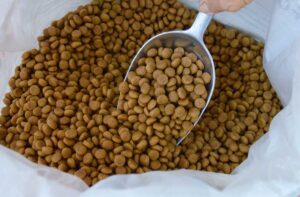
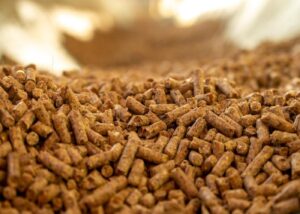
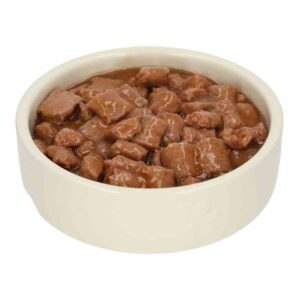

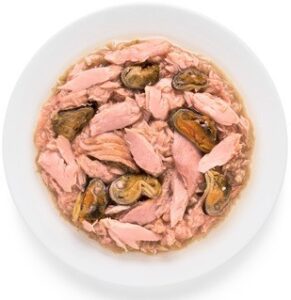
BENEFITS OF PET AND ANIMAL FEED IRRADIATION USING BOXES WITH ELECTRON ACCELERATORS
Destruction of pathogens to improve food safety and reduce production losses
Extended shelf life of treated products
Sterilizes hermetically sealed pet food, preventing recontamination and ensuring quality throughout its shelf life
No residual radiation and free radicals in the treated products
Retains pet food's organoleptic properties for the entire shelf life
High processing speed
Waste-free production, since pet feed is made of poultry by-products
IRRADIATION OF POULTRY
| Treatment mode | Dose | Power | Thickness of treated product | Throughput |
|---|---|---|---|---|
| E-beam | 3 kGy | 100 kW | Up to 50 mm | 120 MT/hour |
| X-Ray | 3 kGy | 100 kW | Up to 1200 mm | 6 MT/hour |
Scientific Reports
Irradiation of poultry meat and its products
IAEA. A compilation of technical data for its authorization and control. 1992
MoreAre you currently interested in poultry treatment to destroy pathogens and extend product shelf life?
If YES, please press the button and we will answer all your questions:
We are ready to implement the technology and need more information